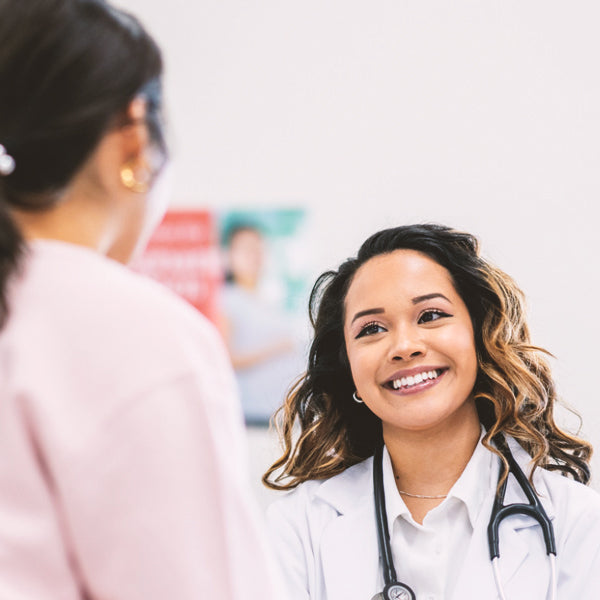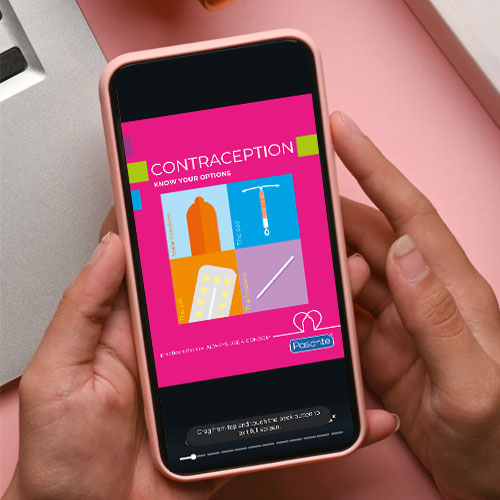
Your Go-To-Guide for Unplanned Sex
Share
It’s easy to get caught up in the excitement and passion of unplanned sex - whether it’s with someone new or a current partner. While these moments can seem exciting, it’s important to know how to take care of yourself and stay safe afterwards. Having the knowledge and confidence about the next steps can help you feel more in control.
With this in mind, let’s explore what to do immediately after unplanned sex, the options available for testing for sexually transmitted infections and contraception, how to communicate with your partner about safety and tips for maintaining your sexual health moving forward.
I’ve had unplanned sex - what do I do?
If you've recently had unplanned sex, there’s no need to panic. It’s normal to feel nervous and unsure of what to do next, but the good news is there are plenty of ways to protect yourself and take care of your sexual health after unprotected sex. From understanding your options for emergency contraception to knowing when and how to get tested for STIs, we’re here to guide you through it - so you don’t have to stress about searching for all the answers on your own.
Step 1: Remain Calm
It’s normal to feel worried or unsure after having unplanned sex, but take a moment to breathe through the worry and remind yourself there are steps you can take to protect your sexual health.
Step 2: Protection
Did you use a condom or did you have unprotected sex? Do you think you may need emergency contraception? If you’re unsure, it’s always a good idea to treat it like you do, and then speak to the nurse or pharmacist who can advise the right course of action.
Step 3: Emergency Contraception
If you’ve had unplanned sex and there’s a chance of pregnancy, you can get emergency contraception, also known as ‘the morning after pill’. This can be taken up to 5 days after unprotected sex, although it’s most effective when taken as soon as possible. You can either pick it up free from a sexual health clinic, or some GP surgeries. It’s also available at most pharmacies, which can be a quick and easy option, but there can usually be a fee for this service.
Step 4: Plan for STI Testing
Sexually transmitted infections (STI’s) aren’t always visible, so you may not always know that you have contracted one, so it’s a good idea to get tested at least 14 days after having unplanned sex, as some STI’s, such as Chlamydia can take that long to show up on a test. However, if you’ve had unprotected sex and think you’re at risk of HIV, discuss straight away at your local sexual health clinic or HIV Clinic who can give you treatment to stop the virus from progressing into HIV.
Step 5: Stock up
If you’ve had unplanned sex without condoms, take steps to avoid having unprotected sex in the future by being prepared. Stock up on your favourite condoms and keep one in a handy condom case within your wallet, handbag or purse. That way, when any spontaneous moments occur in the future, you’ll always have protection on hand.
What options are available for STI Testing and Contraception?
Whether this is your first experience at having unplanned sex, or it’s something you’ve faced before, understanding your options can help you feel more confident, safe and in control of your sexual health.
Sexually transmitted infections
Where to get tested?
There are a few places you can get tested for sexually transmitted infections, such as a local sexual health clinic or your GP surgery. Some sexual health clinics also offer postal kits that can be sent to your home address discreetly, so you can collect samples at home and post them directly to a lab for testing. You can also order an Insti HIV testing kit which can test two weeks earlier than traditional HIV test kits.
When to get tested?
Different STI’S have different time scales in which to get tested after exposure. Chlamydia and gonorrhoea is usually recommended to get tested after two weeks from exposure, whereas HIV can sometimes take up to 12 weeks after exposure to be detected. When you attend a sexual health clinic, they’ll discuss when you last had unprotected sex and tell you the right timescale for you.
How are the tests taken?
If you’ve had unplanned sex recently and have no symptoms of an STI, you may be able to order a self-taken STI kit from your local sexual health clinic. This will either be a urine test or a self-taken swab to test for Chlamydia and Gonorrhoea and sometimes a pin-prick blood test for HIV and Syphilis. Tests for other sexual health infections like Hepatitis C or B are usually done in person at a sexual health clinic, and other sexually transmitted infections can be diagnosed through examination, such as herpes or genital warts.
Contraception
Emergency Contraception (Pills)
Levonorgestrel, like Levonelle, which you can take within 3 days (72 hours) after unprotected sex
Ulipristal acetate, like ellaOne, which you can take within 5 days (120 hours) after unprotected sex.
Emergency Contraception (IUD)
An IUD (intrauterine device) can be fitted within 5 days (120 hours) after unprotected sex. It’s a small, plastic T-shaped device that is placed into your womb by a specially trained nurse or doctor. This can be kept in for up to 5-10 years and be used as your main method of contraception.
Longer-term contraception options
If you’re not on any contraception at the moment, it’s important to consider the different options that are available for regular contraception and choose the right one for you.
Barrier Methods
Condoms
Condoms protect against sexually transmitted infections, HIV and unintended pregnancy so they are the perfect method if you are looking for a triple-layer of contraception. Condoms are available in all different sizes, flavours and sensations, and there’s even an internal condom for those that prefer to take control - so there’s always an option for everyone.
Diaphragms and caps
Diaphragms and caps are another method of contraception that helps prevent pregnancy and sexually transmitted infections. They’re used to cover the cervix to prevent sperm from reaching the egg.
Long Acting Reversible Contraception
Coils
Coils can either be hormonal or non-hormonal, depending on your preference. They’re a small T-shaped device that is inserted into the uterus by a specialist. A copper coil, also known as an IUD (Intrauterine Device) can last between 5-10 years, while a hormonal IUS (Intrauterine System) lasts between 3-8 years. Both methods are long-acting and reversible, which means they can be removed at any time and your fertility will come back. Whilst they protect against pregnancy, you will still need to use a condom to protect against sexually transmitted infections and maintain good sexual health.
Implants
Implants are small rods that are inserted under the skin of your arm that release hormones to prevent pregnancy - they can be effective for up to 3 years and are a good form of contraception if you are looking for one that you don’t have to remember to take every day or attend appointments regularly. Just like with the coil, you will need to use them alongside condoms to protect against sexually transmitted infections.
Depo
The depo is an injection that is given in your arm, usually every 12 weeks to prevent pregnancy. This can be done at either your GP surgery or at your local sexual health clinic. Condoms will also need to be used alongside the depo, to protect against sexually transmitted infections.
Hormonal Contraception
Contraceptive Pill
Oral contraceptives are a method of contraception that you need to take every day, with some requiring a 7 day break once a month. There are pills that contain hormones (oestrogen and progesterone) or non-hormonal (progesterone only). Condoms will also need to be used alongside the pill.
Patches
Patches are a small, adhesive patch that is placed on the skin that releases hormones to prevent pregnancy. You usually have to change them weekly, and it can be a good option if you don’t want to remember to take a contraceptive pill every day.
How to communicate with your partner/s about safety
Talking to your partner about safe sex might feel uncomfortable or awkward, but it’s important to be able to have open, honest discussions with one another to help you feel comfortable and know what to do if you have unplanned sex in the future. Here are some tips on how to communicate with your partner effectively…
Be honest
Begin the conversation by sharing how you feel, and asking if you can talk about safer sex. This opens up the conversation in a positive way so you can begin to discuss your sexual relationship.
Discuss sexual health testing
Once you’re both ready to discuss your sexual relationship, bring up sexual health testing in a casual and open way. Ask questions such as ‘have you been tested recently?’ or share your own experiences. You might like to enquire whether you should both get tested, especially if it’s been a while or you haven’t before - this helps to normalise it.
Discuss contraception
Mention the idea of using condoms or other contraception, and be honest about what you want. Making sure you maintain good sexual health and protect against pregnancy is important for you both, so it’s a good idea to discuss contraception early on in the relationship. Remember; condoms are the only method of contraception that protects against sexually transmitted infections, HIV and pregnancy, so if you choose another method, you’ll need to use a condom alongside it - so make sure you stock up, ready for any other moments of unplanned sex.
Set boundaries
If there’s something you’re not comfortable with, it’s ok to share that with your partner. Setting clear boundaries helps you feel more in control, so if you think they should wear a condom, tell them it’s important to you.
Tips for maintaining your sexual health moving forward
Always carry condoms - whether that’s in your purse, wallet or handbag. Carrying condoms means you’re always prepared, so if a spontaneous encounter occurs again and you end up having unplanned sex - you know that you can always stay safe. With so many options available, like flavoured or ribbed and dotted, you can stay protected whilst enhancing the moment.
Get tested regularly - try to get tested for sexually transmitted infections every six months or after every new partner. Even if you’re not showing symptoms, it’s a good idea to know your STI status as some STIs are symptomless.
Avoid risky behaviour - Taking substances like alcohol or drugs can affect your judgement, making it easier to engage in risky behaviour, such as having unprotected sex. In the heat of the moment, it’s easy to forget about protection, which can increase the chances of unintended pregnancy or catching a sexually transmitted infection (STIs).
Learn about sexual health - the more you know about sexual health, the better prepared you are to make decisions that lead to good sexual health. Understanding how sexually transmitted infections are transmitted,, how different contraceptive methods work and how to maintain sexual health can make you feel in control and confident about your choices.



